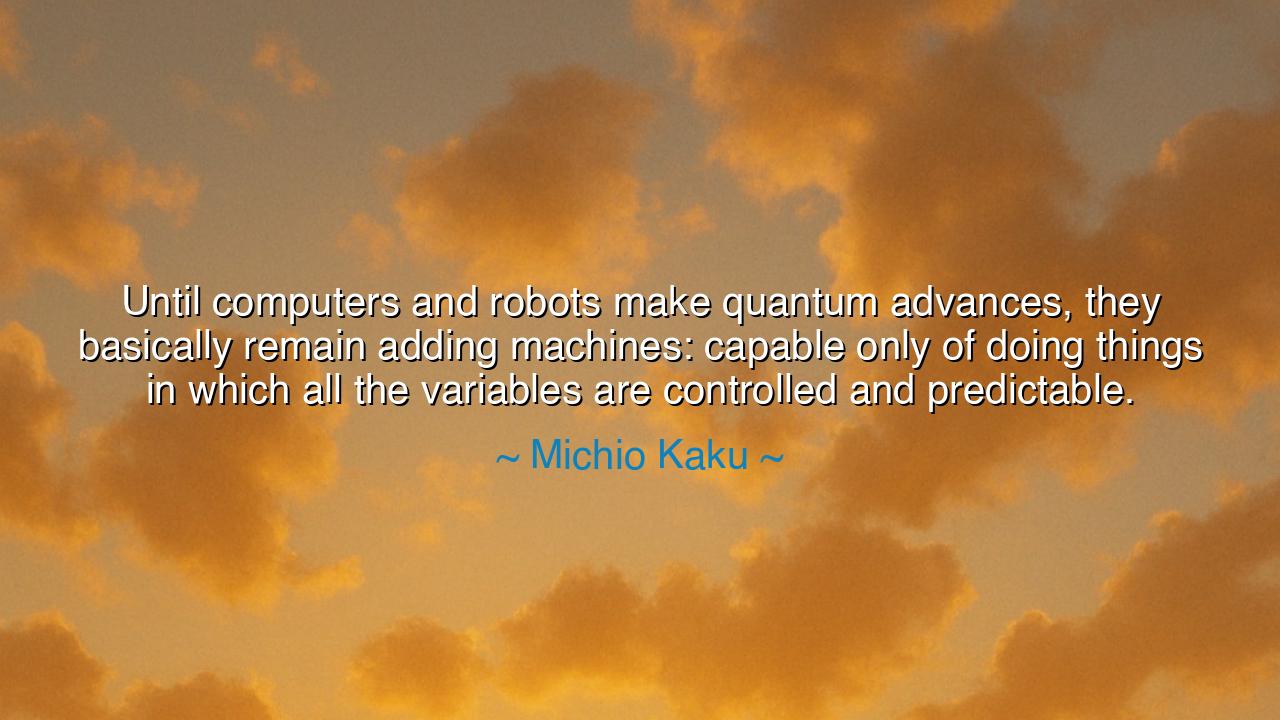
Until computers and robots make quantum advances, they basically
Until computers and robots make quantum advances, they basically remain adding machines: capable only of doing things in which all the variables are controlled and predictable.






In the timeless dance of human discovery, there are those rare moments when the profound wisdom of the ages converges with the cutting-edge revelations of the present. Michio Kaku, the great physicist and visionary, speaks with clarity and foresight when he says, "Until computers and robots make quantum advances, they basically remain adding machines: capable only of doing things in which all the variables are controlled and predictable." These words serve not only as a reflection on the present state of artificial intelligence but also as a warning and a guidepost for the future. They remind us that, while we have achieved remarkable feats in the realm of machines, the true nature of intelligence and autonomy remains beyond our grasp.
To understand the deeper meaning of Kaku’s words, one must look back to the ancient philosophers who, like Socrates, sought to understand the nature of thought and reason. In his dialogues, Socrates often questioned whether true knowledge was the result of empirical observation or whether it was something deeper—an innate understanding that transcended the material world. Similarly, Kaku’s statement points to a critical truth: machines can mimic certain aspects of human intelligence, but they cannot truly think in the same way humans do. Their processes are bound by predictable rules and are limited by the parameters we set for them. Like the ancient Stoics, who understood that true freedom came not from external power but from the ability to control one’s own mind, Kaku reminds us that machines are still slaves to the rules of their programming.
Consider the ancient Greeks, who marveled at the human mind’s capacity for reasoning and creativity. In the hands of great minds like Aristotle, the mind was seen as a divine spark, capable of transcending the limits of the physical world. Yet, as Aristotle himself acknowledged, the mind was always a mystery, something far more complex than the mechanical nature of the body. If we compare this to the machines of today, we find that their reasoning is far less profound. While they excel at performing calculations and following patterns, they cannot reason beyond what they have been explicitly programmed to do. The true quantum leap in artificial intelligence will come when machines begin to break free from the shackles of controlled and predictable variables, and begin to operate in the unpredictable, chaotic realm that defines human existence.
This idea of predictability versus unpredictability is not a new one. In the Renaissance, the great scientist Leonardo da Vinci pondered the mysteries of human and machine. His inventions, though ahead of their time, were built on the idea that machines could never replace human creativity, intuition, or thought. Like Kaku, Leonardo understood that while the mechanical arts were powerful, they were still bound by the predictable nature of physical laws. Leonardo’s machines, though visionary, could never replicate the dynamic nature of the human mind. Even today, we are still searching for that elusive moment when machines can operate not just within the realm of the controlled, but within the chaotic, fluid space where creativity and intuition reside.
And yet, there are those who see in our current technological strides the seeds of something much greater. The story of Isaac Newton, who looked upon the world through the lens of mathematics and physics, is a perfect example of how the universe, at its deepest level, follows predictable laws. Newton’s laws of motion and universal gravitation were based on the idea that, once the variables are understood, the outcomes can be predicted. In many ways, machines today function in the same manner: they rely on predictable algorithms, moving through tasks with the precision of a well-crafted clock. But, as Kaku points out, the true breakthrough will come when the machines can learn to adapt and evolve beyond the rigid constraints that currently bind them.
The lesson of Kaku’s words is a powerful one: while we have made great strides in technology, we must remember that true intelligence is not bound by the laws of predictability and control. In our pursuit of creating more powerful and autonomous machines, we must look beyond the limitations of the current paradigm and strive for something more akin to the human mind—a mind that can adapt, create, and think in ways that are not entirely determined by preordained rules. It is a call to embrace the unknown, to step into the realm of the unpredictable, and to seek progress that transcends mere calculation.
Thus, as we stand on the precipice of artificial intelligence and quantum computing, we must remember that the journey is not simply one of accumulating knowledge but of unlocking the mysteries that lie beyond. Just as the ancients once marveled at the vastness of the human mind and the potential of the unknown, so too must we look forward with both caution and optimism—knowing that the true quantum advances will come not from mastering the known, but from embracing the chaos, the unpredictable, and the yet-to-be-discovered. In this journey, we must remain mindful of the humility of our own intelligence and the vast, uncharted territories that await our exploration.






AAdministratorAdministrator
Welcome, honored guests. Please leave a comment, we will respond soon